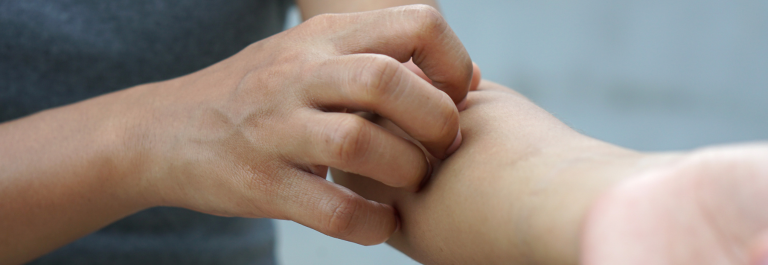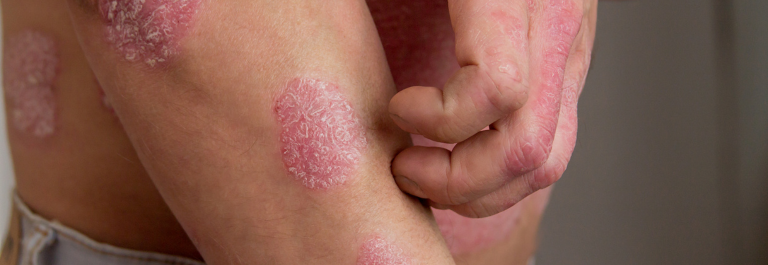Have you ever broken out in an itchy rash after trying a new body wash? Or did you notice your hands swelling and stinging after washing the dishes with dish soap?
If this sounds familiar, you might be experiencing an outbreak of contact dermatitis - a common form of eczema triggered by environmental irritants and allergens such as soap.
Throughout this post, we're going to explore everything you need to know about:
-
The causes and symptoms of contact dermatitis
-
The reasons why soap might trigger irritated skin
-
How to soothe a contact dermatitis skin rash naturally and effectively
Keep reading to learn more about how your soaps, body washes, and laundry detergents might impact your skin's health and better understand how to soothe and prevent contact dermatitis today.
What Is Contact Dermatitis?
Contact dermatitis is an inflammatory skin condition characterized by itchy, dry, and sensitive skin.
These skin reactions typically stem from two primary sources: common allergens or irritants. We'll explain the difference below:
Allergic Contact Dermatitis
Allergic contact dermatitis is caused when your immune system overreacts to environmental allergens, such as poison ivy, specific metals, and fabrics.
Consequently, your immune system floods your bloodstream with histamine and other chemicals to help defend you against these external 'threats,' triggering a full-scale allergic reaction that sometimes manifests in an itchy rash.
Irritant Contact Dermatitis
On the other hand, irritating contact dermatitis is a nonallergic skin reaction caused by contact with irritating substances, such as many of the harsh chemicals or concentrated essential oils found in many personal hygiene products, commercial soaps, and hair dyes.
Symptoms of Contact Dermatitis
Depending on their unique environmental triggers, contact dermatitis is likely to manifest differently for each individual. Having said this, some of the most common symptoms of contact dermatitis include:
-
Leathery patches of skin that are darker than usual (hyperpigmented)
-
Dry, cracked, scaly skin
-
Bumps and blisters
-
Swelling, burning, and skin tenderness
In the case of severe allergic reactions, you may also experience trouble breathing and a sudden drop in blood pressure. These symptoms may be life-threatening, so seek immediate medical attention if you ever experience these changes.
How Can Soap Trigger Contact Dermatitis?
While the sweet vanilla scent of your newest body wash may be relaxing, many artificial fragrances, chemicals, and additives pumped into commercial soaps can wreak havoc on sensitive skin.
That's because these chemicals tend to throw off the delicate pH balance of your skin or strip your skin of its essential natural oils.
In the case of allergic contact dermatitis, common allergens such as cow's milk may be added to soaps to provide extra moisturizing benefits, unknowingly triggering an allergic reaction simultaneously.
How Do You Treat Contact Dermatitis?
If your soap is triggering an itchy rash, there are several steps you can take to both treat your symptoms and prevent any further contact dermatitis flares.
Use An Anti-Inflammatory Moisturiser
Apply a soothing moisturizer directly to the affected area for fast relief to support your skin's natural healing process.
The Nourish + Hydrate Manuka Balm is a buttery, oil-based balm made from nourishing manuka honey, camelia seed oil, sunflower oil, and beeswax to calm even the most aggravated skin. Manuka honey and olive oil boast impressive anti-inflammatory properties, while beeswax boosts your skin's natural hydration levels, helping to reverse swelling, repair dry skin, and reduce itching.
Before trying new creams or balms on your skin, we recommend patch testing first.
Fragrance-Free Soap
There's nothing better than that post-shower squeaky-clean feeling, but it should never come with health costs. Natural soaps offer a safe and effective way to look and feel your best while nourishing your skin barrier.
We'd recommend trying the Coconut and Sunflower Oil Soap Bar, which is 100% fragrance-free and gentle enough for people with chronic skin conditions such as eczema and psoriasis.
Just be sure to shower or bathe in lukewarm water, as hot water will aggravate your skin irritation even more.
Wear Hypoallergenic Clothing
Especially if you're suffering from allergic contact dermatitis, you must find gentle clothing made from hypoallergenic clothing to prevent worsening symptoms.
The Remedywear™ clothing range has been specially designed to provide soft, comfortable, breathable garments. Each item is made from soothing TENCEL and antibacterial Zinc Oxide for effective eczema and psoriasis relief and is 100% hypoallergenic.
For full-body relief from an allergic contact dermatitis rash, we recommend the Remedywear™ Long Sleeve Shirt for Adults and Kids and the Remedywear™ Long Pants for Adults and Kids. Stretchy and form-fitting, these clothes can be worn under everyday clothing or as an anti-itch pajama.
Soothe Your Contact Dermatitis Rash Today
Follow these tips to help you clean up your hygiene routines today, recognizing how your soaps might trigger an itchy contact dermatitis rash and allowing you to soothe your symptoms quickly.













